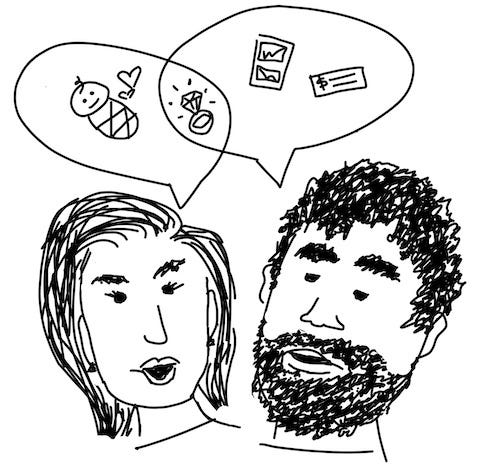The most hellish looping arguments are actually misunderstandings at their core.
To be understood, know this:
People often aren’t saying what we think they're saying. Language fails us because, in truth, we’re just throwing symbols at each other. When you first learn a word or phrase, you don't just store the dictionary definition of it. You hear it in context: the person who said it, what you think *they* meant by it, how others responded. This is cultural. For example, in the US, the word "penny-pincher" has a negative connotation i.e. is considered an insult when used to describe someone. But it's also individual: the word "marriage," for example, might point to different concepts in your brain than in mine. Like maybe I think of marriage as a stuffy legal formality, whereas you think it's the step a couple takes before having kids. Therefore a sentence like "marriage is important" can mean entirely different things to different people. I might respond to it with a question about tax advantages; you might interpret this as me prioritizing money over family.
We interpret actions differently too. e.g. If you’re throwing up, I might think I’m doing you a kindness by giving you privacy, whereas you might think I'm abandoning you. This is why you always want to get clarification before assuming the worst of someone.
The anatomy of a looping going-nowhere argument is repetition without clarification. If someone is repeating themselves, it’s time to define your terms.
In a perfect world, we’d all have mutual curiosity for each other - seeking to understand each other, being slow to jump to conclusions, collabing through clarifying questions.
Mutual curiosity is not always accessible, though, and here’s why. Under most heated arguments that go on and on, at their deepest root, is really a question of whether we are Good (moral, worthy, deserving of love) or Safe (from harm). People on Twitter aren’t vehemently arguing whether "sex is a need" because they’re interested in semantics. For some, saying "sex is a need" qualms fears and insecurities (that asking for sex is unreasonable, or that wanting it makes them bad). For others, it does the opposite (inflaming the fear that if sex is a need it means I owe it, or that not needing it means I'm broken). And so thousands of people end up in a going-nowhere argument about the definition of a word, fighting as if something is at stake.
From a young age, we build elaborate armor around our insecurities. If I think physical attractiveness = Goodness, I’ll continually seek affirmation that I am attractive or could become so. To learn that my Goodness does not hinge on being super attractive would be a WHOLE ORDEAL involving corrective experiences, grieving my past, relearning who I am, doing life differently. To avoid the pain of all that unraveling — and especially the initial terror of "WHAT IF I AM ACTUALLY [thing I think means I'm Bad]?" — when I come across an issue that is a proxy for my insecurity, my brain will helpfully bolster my confidence that I Am Right and blind me to opposing viewpoints. Unfortunately, we all have insecurity like this, whether it's about intelligence, competence, earning potential, being a good friend, or whatever else.
There's also an incentive to obscure our feelings socially, which makes understanding and being understood all the more difficult. That's partly because it's not safe for everyone to know our deep fears and insecurities, and partly because, in much of society, emotions aren’t well-understood. When emotions aren't given their proper place, we end up with a strange kind of pseudo-intellectualism where care is earned by being “right.” Consequentially, people attempt to package strong feelings into logical arguments - consciously or unconsciously hoping that this will win them care and concern. But sound logic is hard and not always compatible with expressing emotions! And many people won’t recognize when an "argument" is actually a bid for comfort or connection. So instead, intellectual-speak begets intellectual-speak: litigative questioning, corrections, *other people's* pseudo-intellectual counter-arguments covering for *their* tender emotions. Not care, not concern, not love.
Where clarification isn’t possible or effective, the best thing you can do for yourself and others is to give up and look elsewhere. I hear talk about "finding your people," but I don't think it's ever stated urgently enough. Finding a safe person to confide in is the answer to almost any question. Safe people don’t have to scale psychological mountains to understand your POV or affirm that you are Good. Find people like this, with whom it’s safe to explore even the hidden truths about yourself, and watch your tolerance for maddening looping arguments wither away.
See/share the tweet version of this essay here.






